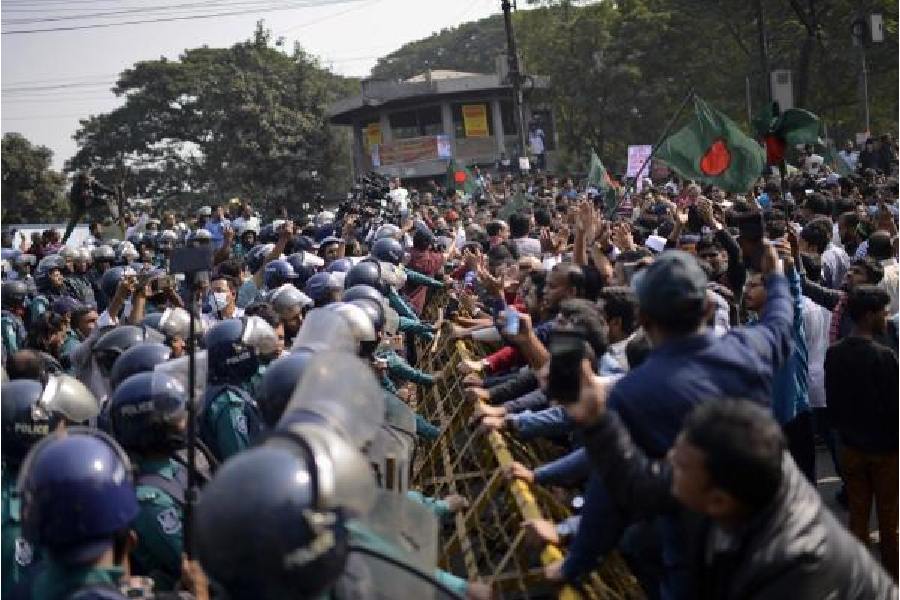The Muhammad Yunus regime on Sunday made noises about smoothening ties with India ahead of Monday’s foreign secretary talks, but a rise in anti-India rhetoric and certain legal and political developments in Bangladesh raised questions about Dhaka’s intent.
During a discussion at the National Press Club in Dhaka, Touhid Hossain, foreign adviser to Yunus, expressed hope that the phase of decline in bilateral trade would be over soon.
“It is affecting not only Bangladesh but also India. The traders of Calcutta are also being affected,” Bangladeshi media quoted Hossain as saying.
Coming against the backdrop of record inflation in Bangladesh, which rose to 10.87 per cent in October, Hossain’s comments suggested Dhaka was keen on the resumption of normal trade with India.
Key members of the Yunus administration had in recent months been claiming that
the government would reduce its food dependence on India and explore new sources like Pakistan or Turkey.
Hossain’s remarks indicated that such claims may have been mere posturing as import from India remains the cheapest option because of the geographical proximity.
Multiple sources in the Bangladesh foreign policy establishment indicated that Dhaka would broach the smooth supply of essentials from India during foreign secretary Vikram Misri’s meeting with his counterpart, Md Jasim Uddin, on Monday.
“Is the situation conducive for the normalisation of trade ties?” a source in Delhi asked, referring to the day’s developments in Bangladesh.
That Dhaka is not yet ready to address India’s prime concern about the arrest of former Iskcon monk Chinmoy Krishna Das became clear with an attempt-to-murder case slapped against him and 163 others in Chittagong.
(India’s neighbours may claim that New Delhi too has shown little interest in addressing their concerns about the treatment of minorities in India.)
A Chittagong court took cognisance of the case after a lawyer sought permission to prosecute Das for alleged violence by the monk’s supporters against his client on November 26.
The Court Hill area in Chittagong had erupted that day after Das was denied bail, with clashes between police and the monk’s alleged supporters. Saiful Islam Alif, a lawyer, was beaten to death on the court premises, with the blame falling on Iskcon supporters. Iskcon has denied the allegations.
The latest case against Das, who was in custody on November 26 on sedition charges for alleged disrespect of the national flag, is being seen as an attempt to prolong his prison term.
Several prominent people in Bangladesh, such as philosopher and activist Farhad Mazhar, have called for Das’s immediate release. Swami Purnatmananda, president of the Ramakrishna Math and Mission in Dhaka, has written to Yunus seeking the release of Das, whose bail plea is likely to come up next on January 2.
A day before Misri’s visit, Dhaka witnessed a huge anti-India gathering. Thousands of members of three youth and student bodies of the Bangladesh Nationalist Party (BNP) marched towards the Indian mission to denounce the attack on the Bangladesh assistant high commission in Agartala and the alleged desecration of the country’s flag in India.
Chanting slogans such as “Delhi or Dhaka? Dhaka, Dhaka!” and “Agents of India, be careful, be careful”, the protesters accused India of trying to incite communal riots in Bangladesh.
The police stopped the protesters around 1km from the high commission. A team of six leaders from the three BNP affiliates was later allowed to submit a memorandum to the Indian high commission.
“If the government is so keen on improving ties with India, why did it allow the BNP to hold such a mega rally a day before the Indian foreign secretary’s arrival?” an observer in Dhaka asked.
Bangladesh High Court on Sunday began hearing arguments on the death reference and appeals in the sensational 10-truck arms haul case, involving the smuggling of a massive cache of weapons into Chittagong in 2004 when the BNP ruled the country.
The arms haul became a big diplomatic issue between India and Bangladesh amid reports that the cache was meant for the Assam militant group Ulfa, some of whose leaders were sheltering in Bangladesh.
“The matter will come up again tomorrow.... There are 14 convicts. Let’s see how the prosecution handles the case. The outcome will surely have a bearing on bilateral ties,” a veteran Bangladeshi journalist said.
Death sentences were handed out in the case during Sheikh Hasina’s rule. Since her ouster on August 5, Bangladesh courts have passed several verdicts favourable to her opponents.
Hasina speech
Hasina on Sunday addressed an Awami League event in the UK virtually and referred to Das’s arrest and his continued imprisonment.
“One monk, Chinmoy Krishna Das was arrested... but not a single lawyer could stand for him. The government should have provided lawyers for him for the sake of justice. But there is no scope for justice in today’s Bangladesh,” she said.
She referred to the arrests of journalists, civil society members and Awami League leaders and workers.
“There is a fascist government in Bangladesh.... The entire country is burning,” she said, urging Bangladeshis to compare her tenure with the current period of fear and violence.











